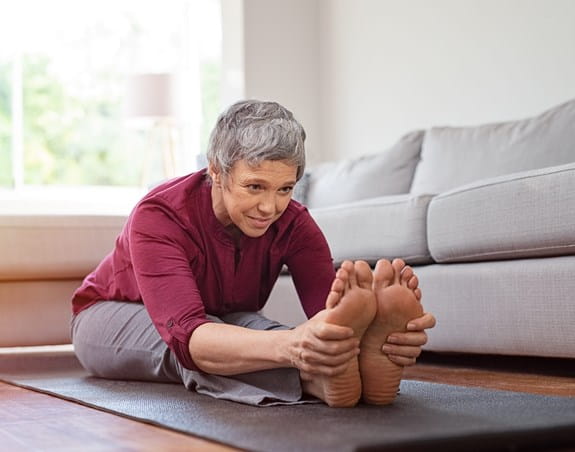All about hormone replacement therapy (HRT)

The benefits and risks of taking HRT to treat the symptoms of menopause
Menopause is the natural point in a woman’s life when her ovaries stop producing the hormones estrogen and progesterone and her menstrual periods stop. This usually happens between the ages of 45 and 55 but can vary. A woman may reach menopause early as a side effect of medical treatment such as chemotherapy or having her ovaries removed.
Symptoms of menopause include hot flashes, mood swings and trouble sleeping, but every woman’s experience is different. Some women may not be bothered by symptoms, while others may find it hard to cope with them. Treatment options are available to help ease symptoms.

Why would a woman in menopause take HRT?
Some women take hormone replacement therapy (HRT) to ease menopausal symptoms. HRT is medicine that contains hormones that the ovaries make less of as women age and reach menopause.
HRT can be taken as estrogen only or as a combination of estrogen plus progestin (combined HRT). Combined HRT is most commonly used. Estrogen-only HRT can increase the risk of uterine cancer (cancer of the uterus), so it is usually only recommended for women who have had a hysterectomy to remove their uterus.
Taking estrogen alone can cause cancer in the lining of the uterus, but women who have had their uterus removed (hysterectomy) can take estrogen alone as they no longer have this cancer risk. Combined HRT is more commonly used by women with a uterus.
Combined HRT may help relieve menopausal symptoms, protect against osteoporosis (thinning of the bones) and reduce the risk of colon cancer.
Research shows that long-term use of combined HRT (for 5 or more years) increases the risk of breast and ovarian cancer, heart disease, stroke and pulmonary embolism (blood clots in the lungs). The research suggests that the risks of long-term combined HRT use outweigh the benefits for most women.
The decision to take HRT is personal and should be made with the help of your doctor. Concerns about cancer, heart disease and stroke should be discussed when considering the benefits and risks of HRT.
Our recommendation
Hormone replacement therapy (HRT) is an effective way to reduce menopausal symptoms and improve quality of life for people experiencing menopause. Some studies show that HRT may increase your risk of breast and ovarian cancer while other studies show no increased risk.
If you are thinking about taking HRT, the Canadian Cancer Society recommends that you talk to your healthcare provider about how HRT can relieve menopausal symptoms and about your individual risks. Low-dose HRT may slightly increase your risk of breast and ovarian cancer, but the risk can be kept low by using it for as short a time as possible.
HRT and cancer
There is strong evidence that using HRT raises a woman’s risk of breast, ovarian and uterine cancers. At the same time, it may lower the risk of colorectal cancer.
Combined HRT for menopause is a known cause of breast cancer, mainly in women who recently used or are still using the therapy. There is also some evidence suggesting that estrogen-only HRT may also increase the risk of breast cancer.
Studies suggest that both combined and estrogen-only HRT increase a woman’s risk of ovarian cancer – but the risk is low.
Research shows that using estrogen-only HRT increases the risk of uterine cancer.
Some studies suggest that users of combined or estrogen-only HRT may have a lower risk of colorectal cancer, while others do not. HRT is not recommended to prevent colorectal cancer.
HRT after cancer
If you have a history of cancer and are thinking about taking HRT, you should know the risks.
- Women with a history of breast cancer may be advised not to take HRT. This is because there are concerns that the estrogen in HRT may cause breast cancer to come back. Different studies tell us different things about the effects of HRT on women with breast cancer, so the risk is not yet fully understood.
- HRT may be an option for women at a higher risk for breast cancer. Although women with an increased risk for breast cancer are usually advised not to take HRT, it might be advised if they have proper counselling and follow-up.
- Women with a history of uterine cancer may be advised not to take HRT. Women who have had higher stage and higher grade uterine tumours have a higher risk of the cancer coming back.

Alternatives to HRT
Women who experience menopausal symptoms often seek relief in ways other than HRT. Not all of the alternatives to HRT have been scientifically proven, but many women do find them helpful.

Are bioidentical hormones more effective and less risky than HRT?
Some hormone products, which may be called bioidentical hormones, are available without a prescription. Bioidentical hormones are made from plant sources and are basically the same as hormones made by our bodies. You may have heard claims that these products are more natural, effective and safe than HRT, but there is no scientific evidence to prove this.
Not all of the alternatives to HRT have been tested to evaluate side effects. HRT may still be useful to ease the symptoms of menopause on a short-term basis if other treatments do not work and the symptoms are severe.
Always check with your doctor before deciding on HRT, herbal products or lifestyle changes.
